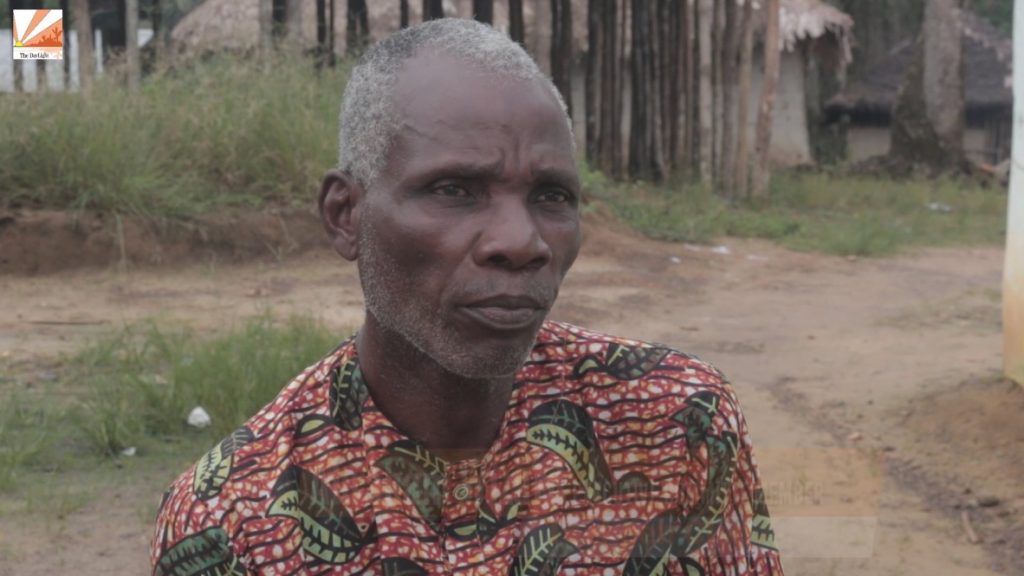Top: Logs EJ&J Logging Company abandoned in the Ziadue & Teekpeh Community Forest. The DayLight/Esau J. Farr
By Esau J. Farr
ZAMMIE TOWN – Villagers in River Cess County have made efforts to cancel a contract it has with a logging company over unpaid benefits and unfulfilled promises.
EJ&J Investment Corporation signed a 15-year contract with Ziadue & Teekpeh in 2018. However, five years after logging in the 24,649-hectare forest, the company has failed to live up to the agreement.
“The community said [it is] not willing to work with EJ&J again and therefore has decided to cancel its contract,” said Philip Tarweah, chief officer of Ziadue & Teekpeh’s community forest management body (CFMB).
EJ&J owes the community more than US$72,000 for land rental, harvesting, scholarships and clinic support funds, according to our calculations as of November last year.
EJ&J failed to construct 16 handpumps and pit latrines each within major towns of the Kploh Chiefdom, where the forest lies. It also did not construct the two schools it promised the community.
In the last three years, Ziadue & Teekpeh has made several failed attempts to get their benefits.
In a June 21, 2021 letter obtained by The DayLight, the community sought a meeting with the company the following month. However, EJ&J did not honor the invitation, according to the townspeople.
The parties finally met three months after and the company promised eight handpumps in five months but has not delivered for more than a year.
Stanley Whilzar, EJ&J’s general coordinator, blames his company’s failure on the coronavirus outbreak.
“When it comes to the pit latrines, the elementary schools…, when we entered the first and second years [it was] when we experienced the COVID-19,” Whilzard said. “We couldn’t lay our hands on those projects.”
Whilzar’s remarks are not backed by facts.
Records of the FDA show EJ & J, harvested 2,150 logs or 13,275 cubic meters of logs from 2020 to 2021, during the height of the pandemic.
There is no evidence that EJ&J declared force majeure to suspend its operations and debts. No logger company did.
‘…More logs in the forest’
The DayLight photographed several large piles of logs EJ&J abandoned in the forest for more than two years. The logs were scattered on both ends of the grassy road that leads to the community forest.

A former worker of the company, who asked for anonymity for fear of reprisal, pointed at several locations in the forest where he said logs were. Villagers corroborated the ex-worker’s story.
“They have felled more logs into the forest, more than 10,000 logs. They are just wasting there,” said Abraham Wizard, a forest leader in Ziadue & Teekpeh.
EJ&J production records appear to support Wizard and other townspeople’s comments. Not one of the 2,150 logs it harvested during COVID-19 has been exported, the records show.
“We have been informing the company and FDA but they are not doing anything about it,” Wizard added.
The FDA did not respond to queries on the issue. However, the agency announced last November it would begin the process of auctioning abandoned logs across the country. It had made that pronouncement at least two times in the past and failed to take any concrete actions.
The FDA shares the blame for what has happened with Ziadue & Teekpeh.
FDA ignored the recommendations of a government-backed report in 2012 by approving EJ&J’s contract with Ziadue & Teekpeh.
Investigators of the Private Use Permit (PUP) Scandal had asked the FDA to set up a panel to assess EJ&J’s financial and logistical capacities before awarding it future contracts.
Investigators uncovered that Eliza Kronyanh, EJ&J’s owner, did not have the financial means to operate independently. They gathered evidence that her company signed contracts only to subcontract to other companies, exploiting locals.
[Additional reporting by Aaron Geezay in River Cess]
Funding for this story was provided by the Kyeema Foundation and Palladium. It was a production of the Community of Forest and Environmental Journalists of Liberia (CoFEJ).




